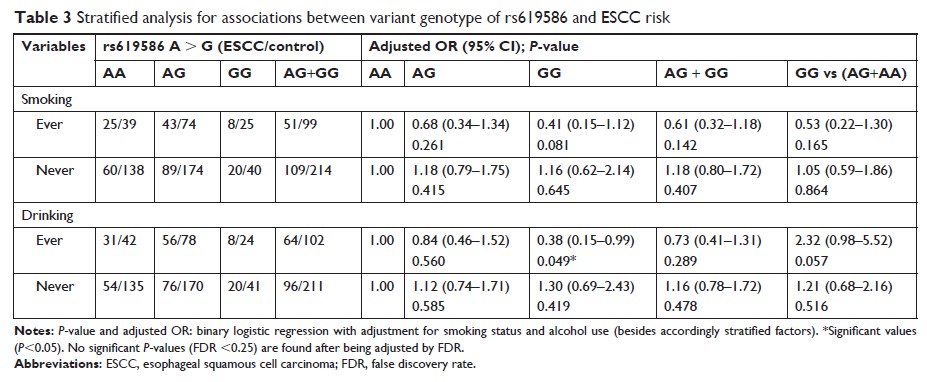108384
论文已发表
注册即可获取德孚的最新动态
IF 收录期刊
- 3.4 Breast Cancer (Dove Med Press)
- 3.2 Clin Epidemiol
- 2.6 Cancer Manag Res
- 2.9 Infect Drug Resist
- 3.7 Clin Interv Aging
- 5.1 Drug Des Dev Ther
- 3.1 Int J Chronic Obstr
- 6.6 Int J Nanomed
- 2.6 Int J Women's Health
- 2.9 Neuropsych Dis Treat
- 2.8 OncoTargets Ther
- 2.0 Patient Prefer Adher
- 2.2 Ther Clin Risk Manag
- 2.5 J Pain Res
- 3.0 Diabet Metab Synd Ob
- 3.2 Psychol Res Behav Ma
- 3.4 Nat Sci Sleep
- 1.8 Pharmgenomics Pers Med
- 2.0 Risk Manag Healthc Policy
- 4.1 J Inflamm Res
- 2.0 Int J Gen Med
- 3.4 J Hepatocell Carcinoma
- 3.0 J Asthma Allergy
- 2.2 Clin Cosmet Investig Dermatol
- 2.4 J Multidiscip Healthc

MALAT1 基因多态性与中国人群食管鳞状细胞癌发病风险的关系
Authors Qu Y, Shao N, Yang W, Wang J, Cheng Y
Received 17 October 2018
Accepted for publication 21 February 2019
Published 3 April 2019 Volume 2019:12 Pages 2495—2503
DOI https://doi.org/10.2147/OTT.S191155
Checked for plagiarism Yes
Review by Single-blind
Peer reviewers approved by Dr Colin Mak
Peer reviewer comments 3
Editor who approved publication: Dr Gaetano Romano
Objective: The main
aim of this study was to investigate the association of polymorphisms in long
non-coding RNA metastasis-associated lung adenocarcinoma transcript 1 (MALAT1)
with the risk of esophageal squamous cell carcinoma (ESCC) in a Chinese
population.
Methods: A total
of 245 ESCC patients and 490 gender- and age-matched cancer-free controls were
genotyped for four tag single nucleotide polymorphisms (SNPs) of MALAT1
(rs3200401 C > T, rs1122709 C > G, rs664589
C > G, and rs619586 A > G). Statistical analyses
including chi-squared test and logistic regression were performed to identify
the association between the tag SNPs and risk of ESCC, and false discovery rate
(FDR) <25% was applied to adjust for multiple comparisons.
Results: We found
that rs3200401 C > T polymorphism of MALAT1 was significantly
associated with increased risk of ESCC (CT vs CC: adjusted OR =1.59, 95% CI
=1.07–2.35, P =0.021; TT vs CC: adjusted OR =2.27, 95% CI
=1.04–4.96, P =0.039; dominant model [CT+TT vs CC]: adjusted OR
=1.68, 95% CI =1.16–2.43, P =0.006). In the stratified analysis, rs3200401 TT and
CT/TT genotypes were associated with increased risk of ESCC compared with CC
genotype in subgroup of never drinking (TT vs CC: adjusted OR =2.34, 95% CI
=1.02–5.34, P =0.044; CT/TT vs CC: adjusted OR =1.52, 95% CI
=1.02–2.26, P =0.041). However, compared with AA genotype, MALAT1
rs619586 GG was associated with decreased risk of ESCC in ever drinking
subgroup (GG vs AA: adjusted OR =0.38, 95% CI =0.15–0.99, P =0.049). The
results remained significant after FDR adjustment (FDR value <0.25) except
for the comparison between rs619586 GG and AA genotype in ever drinking
subgroup.
Conclusion: Taken
together, our findings proposed that polymorphism rs3200401 C > T
in MALAT1 gene is associated with increased risk of ESCC. Since the association
between rs619586 A > G polymorphism and ESCC risk was not
significant after FDR adjustment, there was a minor possibility that rs619586
A > G might be a protective factor for ESCC.
Keywords: MALAT1,
polymorphism, esophageal squamous cell carcinoma, single nucleotide
polymorphism, susceptibility
